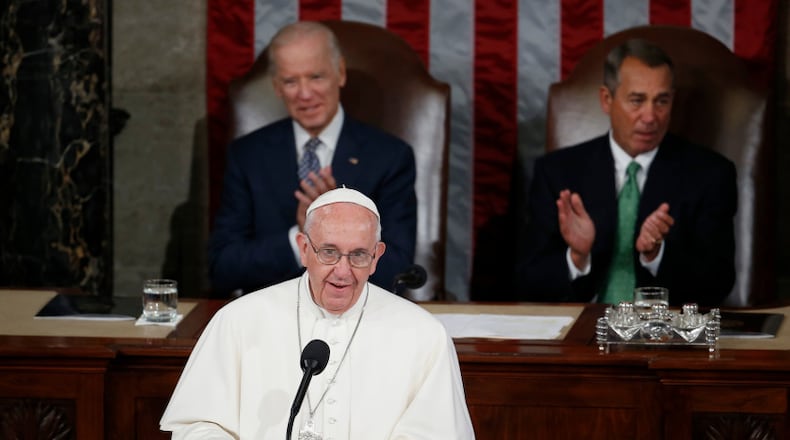I've been reading through the speech by Pope Francis, looking for a passage or two that particularly struck home, but choosing among them has proved difficult. Overall, I was struck by the sense of humility that Francis demonstrated. The wisdom that he offered in his speech was offered on its own merits, to be accepted or rejected on those merits. He did not try to cloak it as the word of God and did not suggest that to think otherwise would be unChristian or unCatholic. In that sense, he offered an important model in how faith can respectfully inform political discussion.
He was eloquent on the plight of the immigrant and the refugee, and also on the dangers of religious friction and extremism. "We know that no religion is immune from forms of individual delusion or ideological extremism," he told Congress. ".... We know that in the attempt to be freed of the enemy without, we can be tempted to feed the enemy within. To imitate the hatred and violence of tyrants and murderers is the best way to take their place."
He also spoke plainly about the need to address poverty, while also noting that "the harnessing of the spirit of enterprise" must play a crucial role. “Business is a noble vocation, directed to producing wealth and improving the world," he said in words that must have confusing to some. "It can be a fruitful source of prosperity for the area in which it operates, especially if it sees the creation of jobs as an essential part of its service to the common good.”
However, the part that I found most interesting was his praise of dialogue:
"I would like to recognize the efforts made in recent months to help overcome historic differences linked to painful episodes of the past. It is my duty to build bridges and to help all men and women, in any way possible, to do the same. When countries which have been at odds resume the path of dialogue – a dialogue which may have been interrupted for the most legitimate of reasons – new opportunities open up for all. This has required, and requires, courage and daring, which is not the same as irresponsibility. A good political leader is one who, with the interests of all in mind, seizes the moment in a spirit of openness and pragmatism. A good political leader always opts to initiate processes rather than possessing spaces."
On its face, that would seem to be obvious praise for the reopening of diplomatic relations between the United States and Cuba, where Francis visited just before coming to Washington. In fact, the Vatican played an important behind-the-scenes role in brokering that deal, a fact that continues to anger anti-Castro conservatives. But the pope's embrace of dialogue applies equally well to the successful negotiations that ended Iran's nuclear-weapons program without resort to force. And it stands in stark contrast to the overall approach to foreign policy laid out by Republican presidential candidates.
During last week's CNN debate, for example, Scott Walker demanded cancellation of the upcoming state visit by Chinese President Xi Jinping. Carly Fiorina jumped in to say that she would take a similar approach to Russia. "Having met Vladimir Putin, I wouldn't talk to him at all," she said. "We've talked way too much to him."
Marco Rubio has been highly critical of the decision to reopen diplomatic relations with Cuba, claiming that by agreeing to nation-to-nation talks, President Obama has brought "legitimacy to a state sponsor of terror," and as far as I know the entire GOP field has joined Rubio in that position. Likewise, Republicans were pretty much unanimous in condemning Obama's decision to open negotiations with Iran a couple of years ago. Long before they had any idea how those negotiations would turn out, they were stridently opposed to the mere idea of discussions.
All of those positions share a common premise: To talk with an enemy is an act of weakness, even cowardice, while a refusal to talk or compromise is a bold demonstration of strength. Ronald Reagan, Richard Nixon, George H.W. Bush -- they didn't approach the world that way, but something has changed. I don't think it's a stretch to point out that we can find that same mindset applied here at home as well, in our own domestic political debates. As Francis wisely pointed out, that kind of approach is born of "the simplistic reductionism which sees only good or evil; or, if you will, the righteous and sinners."
If we allow ourselves to see the world that way, we will always cast ourselves, our party, our faith and our nation in the category of the righteous, reducing our enemy to the role of evil with whom there can be no compromise. But the world is more complicated than that; we are all more complicated than that. And the thing that some fear most about dialogue is that it may force us to recognize that no, our opponent actually isn't the pure embodiment of evil that we thought him to be. In fact, the most enlightening moment is often the moment in which we first glimpse the world through the eyes of the other side. It is also the most terrifying moment.
It gets back to Matthew 7:12, the single piece of scripture cited by Francis in his entire 34,000-word address: "Do unto others as you would have them do unto you."
About the Author
The Latest
Featured



